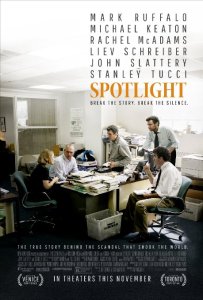 “Spotlight” may be the only journalism movie actually about journalism. “All the President’s Men”, this film’s closest companion, is about seeing in the dark and finding the needle in the haystack. “Ace in the Hole” is about escaping a trap through sketchy ethics and deceit. “Sweet Smell of Success” is about power achieved through words, wit and gossip. “Citizen Kane”? Well, that’s about a lot of things.
“Spotlight” may be the only journalism movie actually about journalism. “All the President’s Men”, this film’s closest companion, is about seeing in the dark and finding the needle in the haystack. “Ace in the Hole” is about escaping a trap through sketchy ethics and deceit. “Sweet Smell of Success” is about power achieved through words, wit and gossip. “Citizen Kane”? Well, that’s about a lot of things.
Thomas McCarthy’s film is not a thriller, a caper, a neo-noir or a melodrama. It does not have an ominous villain, a series of disturbing threats as the conspiracy unravels, or any suspense set pieces. Like “All the President’s Men”, “Spotlight” is a movie of hunches, discovery, research and hard work. The film embodies the philosophy of slow journalism, and it endlessly piles and escalates its stakes until finally both the journalists and us have a real story. A good journalist knows there’s always a follow-up to be had, there’s always more questions to be asked, more digging, and “Spotlight” just keeps going.
McCarthy’s film is the story of how the Boston Globe uncovered a series of child molestation cases among Boston priests, a revelation that eventually stretched far beyond Boston and all the way to the Vatican. The Spotlight team that uncovered the scandal started under the prodding of their new editor-in-chief, the stoic and emotionless Marty Baron (Liev Schreiber). A priest was accused of molestation, and there’s a suggestion that Boston’s Cardinal Law may have known about it, leading the paper to sue the church and try and find the deeper story.
Michael Keaton plays Spotlight’s editor Walter “Robby” Robinson, and when we first meet him he’s giving a goodbye speech to a retiring editor just before Baron has arrived. “What the hell do you know,” he asks jokingly. These guys can smell a story, and as his team (played by Mark Ruffalo, Rachel McAdams and Brian d’Arcy James) starts to ask questions, their obstacles are not only those who want to keep quiet, but their colleagues who are professionals, who have been around and know that many of these angles have already been done.
McCarthy’s screenplay along with Josh Singer (“The Fifth Estate”) is so perceptive to the journalism industry. These characters have persistence, they listen, and they constantly clarify. One of their sources even barks at them, “Why do you keep repeating everything I say?” And when they reveal their initial findings to senior editor Ben Bradlee Jr. (John Slattery), he reacts in the same straight-faced enthusiasm the audience is thinking: “90 fucking priests?”
And yet “Spotlight” is so sharp and tense because it avoids the bastions of many journalism films. “Truth”, starring Cate Blanchett and Robert Redford is currently in theaters, and “Spotlight” never even utters the word. It doesn’t try and position journalists as noble men and women exposing corruption and scandal; they’re just doing their job. Only occasionally do they allow moral high ground to take over and remind themselves that kids are being raped, but time and again they withhold reporting until the full story is told. When all is said and done, Baron congratulates them with the praise, “A story like this is why we do this, but we have to get back to work.”
McCarthy is more interested in the subtle ways this investigation gnaws away at these characters’ psychology. “Spotlight” is a film as much about losing faith in religion and belief as it is uncovering the truth. McAdams’s Sacha Pfieffer can’t look her church-going aunt in the eye the same way. James’s Matt Carroll has a priest living a block away. And Keaton’s Robinson ultimately takes the weight of the lives at stake onto his own shoulders.
Such complexity in characters is essential for an ensemble piece like this, and “Spotlight” has a stellar one. Mark Ruffalo is relentless and enthusiastic in the part, but he’s calm and likeable when doing his job, and we can feel the stress he’s exerting when he finally lets loose in a rage. Keaton is a mile away from the bigness of his “Birdman” work but feels right at home, modest and reserved but with a rumbling and subtle Boston accent that makes him feel like a local and a veteran. Schreiber is the biggest surprise, monotone to the point that he can’t be read. He withholds his words and hints that he’s harboring a vendetta against the church, but Schreiber’s work is too good for us to peer inside that vault.
“Spotlight” is all soft shades of blues and tight, carefully constructed static shots that give the film a docu-realistic, testimonial quality. Unlike the dark, even surreal flavor of “All the President’s Men”, “Spotlight” is neutral in both its themes and its aesthetics.
The sting of the Catholic sexual molestation scandal has dissipated since the story first broke. “Spotlight” and its shocking credits stinger will surely reignite that attention. But “Spotlight” is a journalistic film about objectivity. There are still questions to be asked and work to be done.
4 stars
